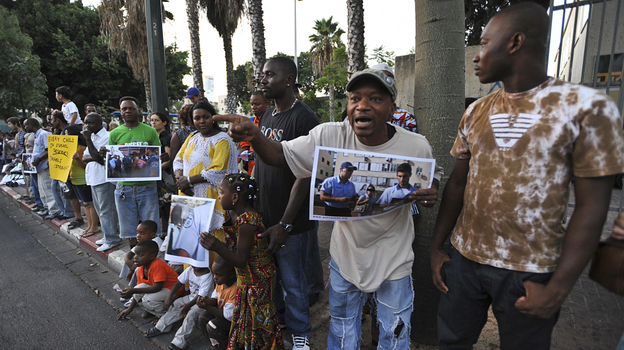Egypt did not meet its obligations, and the UN concluded that Sweden had violated international conventions against torture since it was aware of Egypt's troublesome record on such matters. Israel's expulsion of 50 nationals of African countries to Egypt on Saturday may also be viewed as a violation of that same convention, in light of testimonies received in the past about the conditions of incarceration and the torture suffered by African asylum-seekers who were expelled to Egypt from Israel.
Attorney General Menachem Mazuz argues that Israel did not "expel" the refugees, but rather Israel "prevented their entry" into the country and is therefore not violating international accords.
According to international law, any person who crosses the border of a country and claims asylum, even if this person is not recognized as a refugee, is entitled to a hearing.
| ||
International refugee law is a set of rules and procedures that aims to protect, first, persons seeking asylum from persecution, and second those recognized as refugees under the relevant instruments. Its legal framework provides a distinct set of guarantees for these specific groups of persons, although, inevitably, this legal protection overlaps to a certain extent with international human rights law as well as the legal regime applicable to armed conflicts under international humanitarian law.
The main sources of refugee law are treaty law, notably the 1951 Convention relating to the status of refugees (1951 Refugee Convention) and its 1967 Protocol, and customary international law. Customary international law applies to all states irrespective of whether they are a party to relevant treaties or not. Regional instruments represent a further set of protections, particularly the 1969 Organization of African Unity Convention (for Africa) and, although it is not formally legally binding, the 1984 Cartagena Declaration (for Latin America).
The Definition of a Refugee
International legal protection of refugees centres on a person meeting the criteria for refugee status as laid down in the 1951 Refugee Convention. Under Article 1(A)2, the term “refugee” shall apply to any person who:
Thus, according to this provision, refugees are defined by three basic characteristics:
It is important to stress that the term “asylum seekers” refers to persons, who have applied for asylum, but whose refugee status has not yet been determined.
|
The place is Tel Aviv, but it doesn't look at all like Israel: Dozens of African men are sitting on broken stools and plastic at a makeshift restaurant.
Sudanese fare is on the menu. The men scoop up the stews and salads that remind them of home.
Abdullah Mohammad Mustafa started this restaurant with a couple of other African men who arrived in Israel five years ago from Sudan's troubled Darfur region. They are among some 40,000 Africans who have come to Israel illegally, and many have congregated in neighborhoods in Tel Aviv.
Mustafa is among the many Africans and Asians who have been arriving in Israel in recent years, and most have been sneaking across the country's porous southern border with Egypt.
Israel is now taking a series of steps to stop the influx and reverse the flow. This summer, Israel will begin deporting those who agree to leave voluntarily. Other parts of the plan are still under construction — like a 150-mile fence being built along the border with Egypt. And there will also be a massive detention center.
"Like many other countries in the world, Israel faces a serious problem with illegal immigration," says Josh Hantman, a spokesman for Israel's Defense Ministry. "Israel always has to find the most humane way of dealing with this tricky issue."
He says the detention center, which will be completed later this year, will have spacious rooms, computers and a sports center. Detainees will have access to lawyers and health care.
By the end of this year, Israeli officials say, the facility will be able to hold several thousand people. By the time it is fully built, it will have a total capacity of 11,000 people — making it one of the largest detention facilities in the world.
"We see from other countries that the effect of detention centers on asylum seekers that went through trauma in their home countries, or on their way to Israel, will be very harmful for their health, both mental and physically," says Shachar Shoham, the director of the Migrants Department at Physicians for Human Rights.
Shoham says Israel already has a policy of detaining some of the people who enter the country without permission. Up until now, they've been sent to Ketziot, a sprawling prison in southern Israel.more from Npr



No comments:
Post a Comment